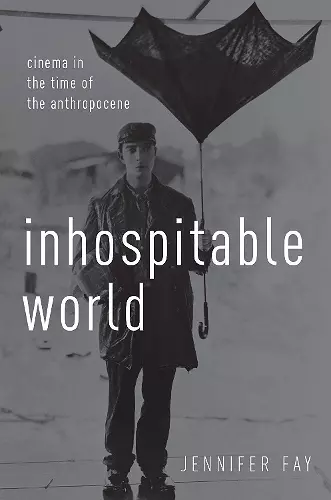Inhospitable World
Cinema in the Time of the Anthropocene
Format:Paperback
Publisher:Oxford University Press Inc
Published:19th Apr '18
Currently unavailable, and unfortunately no date known when it will be back

In recent years, environmental and human rights advocates have suggested that we have entered the first new geological epoch since the end of the ice age: the Anthropocene. In this new epoch, humans have come to reshape unwittingly both the climate and natural world; humankind has caused mass extinctions of plant and animal species, polluted the oceans, and irreversibly altered the atmosphere. Ironically, our efforts to make the planet more hospitable to ourselves seem to be driving us toward our inevitable extinction. A force of nature, humanity is now decentered as the agent of history. As Jennifer Fay argues, this new situation is to geological science what cinema has always been to human culture. Film, like the Anthropocene, is a product of the industrial revolution, but arises out of a desire to preserve life and master time and space. It also calls for the creation of artificial worlds, unnatural weather, and deadly environments for entertainment, scientific study, and devising military strategy. Filmmaking stages, quite literally, the process by which worlds and weather come into being and meaning, and it mimics the forces that are driving this new planetary inhospitality. Cinema, in other words, provides an image of "nature" in the age of its mechanical reproducability. Fay argues that cinema exemplifies the philosophical, political, and perhaps even logistical processes by which we can adapt to these forces and also imagine a world without humans in it. Whereas standard ecological criticism attends to the environmental crisis as an unraveling of our natural state, this book looks to film (from Buster Keaton, to Jia Zhangke, to films of atomic testing and early polar exploration) to consider how it reflects upon the creation and destruction of human environments. What are the implications of ecological inhospitality? What role might cinema and media theory play in challenging our presumed right to occupy and populate the world? As an art form, film enjoys a unique relationship to the material, elemental world it captures and produces. Through it, we may appreciate the ambitions to design an unhomely planet that may no longer accommodate us.
[A] stunningly original and deeply troubling book... Throughout the text, Fay makes astonishing and compelling connections between these films and the collapse of a once ecologically stable world. The result is a groundbreaking, one-of-a-kind book destined to be a classic. This is film criticism at its most urgent and impressive. Essential. * CHOICE *
...[an] elegant new book... * Moira Weigel, Journal of Cinema and Media Studies *
Jennifer Fay beautifully writes a wide-ranging and suggestive theory of cinema in the atomic light of the Anthropocene. * William Brown, University of Roehampton, London, Film-Philosophy *
Compelling and brilliant on every page, Inhospitable Worlds shows where film figures in the slow burn of the Anthropocene. In five clearly drawn and meticulously documented studies running from Keaton to noir, from China's three gorges to atomic testing sites in Nevada, and from the South Pole to the Yukon, Fay draws attention to contradictions and dilemmas at the core of cinema. Crafting a strategy of melancholy to rethink its condition past and present, Fay turns criticism in new and definitive directions. Anyone having concern about the condition of our planet must read Inhospitable Worlds. * Tom Conley, Abbott Lawrence Lowell Professor of Visual and Environmental Studies and of Romance Languages and Literatures, Harvard University *
At a time when much of the world is consumed with anxiety about the fate of the planet, Jennifer Fay shows us a way forward by traveling backward ironically and locating our future in the present. Inhospitable World reveals a history of cinema mobilized, as it were, for the purposes of rendering and conveying a world crisis as it unfolds. Cinema, in Fay's hands, is not only a vehicle, nor merely a medium, but a technology designed in part to capture this crisis invisible elsewhere. Not only a breath-taking feat of film scholarship, Inhospitable World is also a genuine contribution to the task of critical thought in a time of despair. It serves as an exhortation. * Akira Mizuta Lippit, T. C. Wang Family Endowed Chair in Cinematic Arts, University of Southern California *
Inhospitable World teems with cinematic lessons in survival, from the 'survival burlesques' of Buster Keaton to Bill Morrison's chronicle of the Dawson City Film Find. But there's a catch: the survivors of the Anthropocene may not be human. In Fay's arresting account, cinema's profuse world-making hastens, even as it broods on, the unmaking of human futurity. The history of film is retold in these pages as a rehearsal for a world without us.
- Winner of Named a ^ICHOICE^R Outstanding Title Honorable Mention for the 2019 ASLE Ecocritical Book Award, Association for the Study of Literature and Environment Shortlisted for the 2019 Best Moving Image Award, Kraszna-Krausz Foundation.
ISBN: 9780190696788
Dimensions: 155mm x 234mm x 18mm
Weight: 386g
272 pages